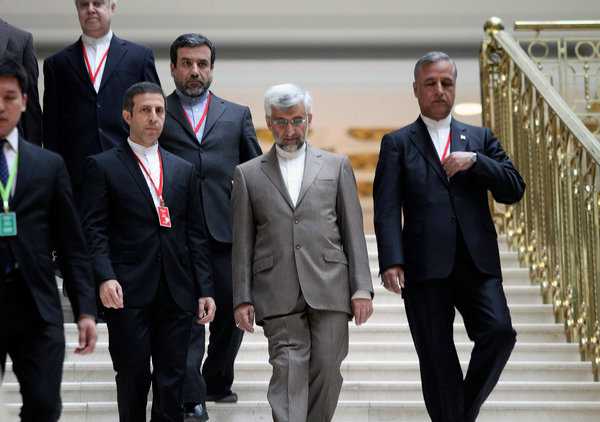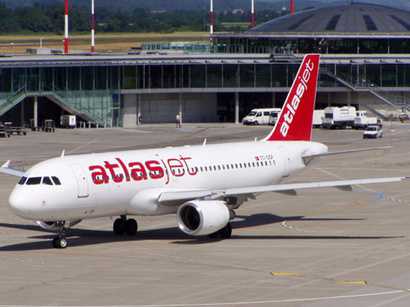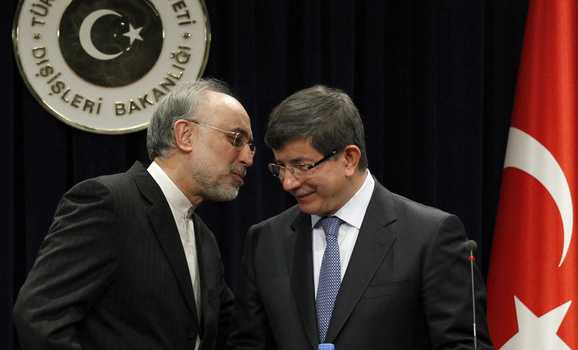Almaty, Kazakhstan__ Negotiators from Iran and six world powers announced they would hold two more meetings over the next month to discuss a new international proposal aimed at curbing Iran’s 20% enrichment and nuclear breakout capacity, in exchange for some sanctions relief. The announcement came at the conclusion of two days of talks here that have seemingly turned out to be among the most positive of the past year, though both sides say they still have some work to do to narrow differences.

The parties agreed to hold an experts meeting in Istanbul on March 18, followed by a political directors meeting, again in Almaty, Kazakhstan on April 5-6, negotiators from the P5+1 and Iran announced in a joint statement at the conclusion of talks Wednesday.
Iran’s chief negotiator Saeed Jalili described the Almaty meeting as “positive,” while his American and European counterparts characterized it, more cautiously, as “useful,” stressing the imperative is results, not atmospherics.
“I would say it was a useful meeting,” a senior US official told journalists Wednesday. “The day we have concrete results, I will use a different adjective.”
European Union foreign policy chief Catherine Ashton, speaking at the conclusion of talks Wednesday, said she welcomed if the Iranian side “are looking positively at proposals we put forward.” But, she added, “I believe in looking at what the results are.”
The centerpiece of the two-day meeting was a presentation Tuesday by Ashton of a revised international proposal focused on curbing Iran’s 20% enrichment, suspending operations at the fortified Fordow enrichment facility, and increasing nuclear safeguards, transparency and IAEA inspections that would prevent a rapid Iranian breakout capability, the US diplomat said.
The updated offer somewhat eases demands to entirely “stop, shut and ship” its 20% stockpile made in a proposal put forward in Baghdad last May.
Unlike the past proposal, the updated one would allow Iran to keep a sufficient amount of its 20% enriched fuel to fuel a research reactor that produces isotopes to treat Iranian cancer patients, the US diplomat said.
The revised proposal also calls for “suspension of enrichment” at Fordo–rather than shuttering the fortified facility, built into a mountain in Qom– and would “constrain the ability to quickly resume operations there,” the American official said. It also calls for enhanced IAEA monitoring measures “to promote greater transparency…and provide early warning” of any attempted breakout effort, the official said.
In exchange, the proposal offers an easing of some sanctions. The US official said the proposed sanctions relief at this stage does not involve oil or financial sanctions, but other US and European Union imposed sanctions, which the official declined to specify. It would also offer to not impose new UN Security Council or European Union proliferation sanctions, as the previous offer also had. “We never regarded sanctions as an end in themselves,” the American official said.
The US official declined to say whether the updated proposal asks Iran to halt installation of more advanced centrifuges at its Natanz enrichment facility, that could considerably speed up Iran’s enrichment capacity.
Jalili offered rare praise for the international proposal, acknowledging it demonstrated a clear effort to respond to Iranian concerns. “We believe this is a…turning point,” he said through at a translator at a press conference Wednesday. The six parties “have moved closer to our proposal.”
There were signs over the past two days that the meeting was going well compared to earlier rounds.
Members of Iran’s negotiating team held a series of unannounced bilateral meetings with diplomats from Russia, China, and unusually Germany and the UK Tuesday night, western officials said. (Former Iranian ambassador to the UK Rasoul Movahedian-Atar, a member of Iran’s negotiating team here, met with former British ambassador to Iran Simon Gass, who now serves as the lead British negotiator at the talks, American and British diplomats said.)
The lack of aggressive Iranian posturing as the meeting got underway Tuesday hinted that Iranian negotiators may have been persuaded that the revised P5+1 proposal had moved at least some way to respond to their concerns, including in offering some sanctions relief, and that they should at least agree to study and discuss it further.
By the conclusion of talks Wednesday, it was evident that Iran had decided to spin the updated offer as a diplomatic success for Tehran, that responded to an Iranian proposal presented at a meeting in Moscow last June.
Also notable, the Iranian delegation did not hang posters of assassinated Iranian nuclear scientists on the podium before Jalili’s press conference, as it had at several earlier rounds.
Earlier in the week, on the eve of talks, Western diplomats said they would like to come to agreement here on a follow-on meeting, or series of meetings, at the expert level. A meeting of non-proliferation experts held last July in Istanbul was productive and involved more US-Iran interactions, American officials said Monday.
Lead US negotiator at the talks, Under Secretary of State for Political Affairs Wendy Sherman, travels Thursday to Israel, Jordan and Saudi Arabia to brief Middle East allies and GCC states about the Iran consultations and other matters.
(Pool Photo, via NYT.)
via Iran, world powers agree to new nuclear talks in Istanbul, Almaty | The Back Channel.





